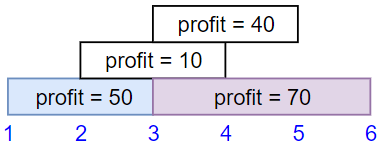Given certain jobs with start and end time and amount you make on finishing the job, find the maximum value you can make by scheduling jobs in non-overlapping way.
Dynamic programming solution. O(N^2) runtime, O(N) space
First sort all the jobs in ascending order based on their end time. This makes checking if two jobs overlap or not easier.
State: maxGain[i]: Given the first i jobs, the max profit we can get by selecting jobs[i].
Function: maxGain[i] = max {maxGain[i], maxGain[j] + jobs[i].gain}, for j in [0, i)
Initialization: maxGain[i] = jobs[i].gain, as we know by selecting jobs[i], we at least have a profit of jobs[i].gain.
Answer: the max value of maxGain[i].
1 import java.util.Arrays; 2 3 class Job implements Comparable<Job>{ 4 int start; 5 int end; 6 int gain; 7 Job(int start, int end, int gain) { 8 this.start = start; 9 this.end = end; 10 this.gain = gain; 11 } 12 public int compareTo(Job o) { 13 return this.end - o.end; 14 } 15 } 16 public class WeightedJobScheduling { 17 public int getMaxGain(Job[] jobs) { 18 Arrays.sort(jobs); 19 int[] maxGain = new int[jobs.length]; 20 for(int i = 0; i < maxGain.length; i++) { 21 maxGain[i] = jobs[i].gain; 22 } 23 for(int i = 1; i < maxGain.length; i++) { 24 for(int j = 0; j < i; j++) { 25 if(jobs[i].start >= jobs[j].end) { 26 maxGain[i] = Math.max(maxGain[i], maxGain[j] + jobs[i].gain); 27 } 28 } 29 } 30 31 int max = Integer.MIN_VALUE; 32 for(int i = 0; i < maxGain.length; i++) { 33 if(maxGain[i] > max) { 34 max = maxGain[i]; 35 } 36 } 37 return max; 38 } 39 }
This is the same problem with https://leetcode.com/problems/maximum-profit-in-job-scheduling/
We have n jobs, where every job is scheduled to be done from startTime[i] to endTime[i], obtaining a profit of profit[i].
You're given the startTime , endTime and profit arrays, you need to output the maximum profit you can take such that there are no 2 jobs in the subset with overlapping time range.
If you choose a job that ends at time X you will be able to start another job that starts at time X.
Example 1:

Input: startTime = [1,2,3,3], endTime = [3,4,5,6], profit = [50,10,40,70] Output: 120 Explanation: The subset chosen is the first and fourth job. Time range [1-3]+[3-6] , we get profit of 120 = 50 + 70.
Example 2:

Input: startTime = [1,2,3,4,6], endTime = [3,5,10,6,9], profit = [20,20,100,70,60] Output: 150 Explanation: The subset chosen is the first, fourth and fifth job. Profit obtained 150 = 20 + 70 + 60.
Example 3:

Input: startTime = [1,1,1], endTime = [2,3,4], profit = [5,6,4] Output: 6
Constraints:
1 <= startTime.length == endTime.length == profit.length <= 5 * 10^41 <= startTime[i] < endTime[i] <= 10^91 <= profit[i] <= 10^4
Given the input size of 5 * 10^4, the previous O(N^2) solution is too slow. The bottleneck is that the O(N^2) solution requires O(N) time to find the maximum job profit from 0 to i - 1 jobs that does not overlap with the ith job. Since we already sorted all the jobs based on their end time, we know that for two index j and k, if j < k, if the kth job does not overlap the ith job, the jth job does not overlap with the ith job either. If we can make sure that the biggest index of j < i gives us the max profit from scheduling 0 to jth jobs, we can apply binary search to speed up the runtime from O(N) to O(logN).
We achieve the above goal by redefining dp[i] to be the max profit out of 0 to the ith jobs, not the max profit out of 0 to the ith jobs with the ith job scheduled. The dynamic programming state definition in the O(N^2) solution forces us to check each smaller index in order to find the max profit that does not overlap the ith job.
state: dp[i]: max profit out of 0 to ith jobs
dp[i] = Math.max(dp[i - 1], max profit out of 0 to ith jobs, including the ith job)
O(N * log N) runtime
class Solution { class Job { int start, end, profit; Job(int start, int end, int profit) { this.start = start; this.end = end; this.profit = profit; } int getEnd() { return end; } } public int jobScheduling(int[] startTime, int[] endTime, int[] profit) { int n = profit.length; Job[] jobs = new Job[n]; for(int i = 0; i < n; i++) { jobs[i] = new Job(startTime[i], endTime[i], profit[i]); } Arrays.sort(jobs, Comparator.comparingInt(Job::getEnd)); //dp[i]: max profit out of 0 to ith jobs //dp[i] = Math.max(dp[i - 1], max profit out of 0 to ith jobs, including the ith job) int[] dp = new int[n]; dp[0] = jobs[0].profit; for(int i = 1; i < n; i++) { int currProfit = jobs[i].profit; //find the max profit out of all 0 to i - 1 jobs that has no intersection with the current job. //A linear search causes TLE; since we already sorted jobs based on their end time and the dp //array is sorted in non-decreasing nature(always pick the max possible value). This means as long //as we find the largest j, j < i, that jobs[j].endTime <= jobs[i].startTime, we can just skip all //the rest jobs k with k < j, because dp[k] <= dp[j]. int lastNonOverLapIdx = binarySearch(jobs, 0, i - 1, jobs[i].start); currProfit += lastNonOverLapIdx >= 0 ? dp[lastNonOverLapIdx] : 0; dp[i] = Math.max(currProfit, dp[i - 1]); } return dp[n - 1]; } private int binarySearch(Job[] jobs, int l, int r, int t) { while(l < r - 1) { int mid = l + (r - l) / 2; if(jobs[mid].end <= t) { l = mid; } else { r = mid - 1; } } if(jobs[r].end <= t) { return r; } else if(jobs[l].end <= t) { return l; } return -1; } }